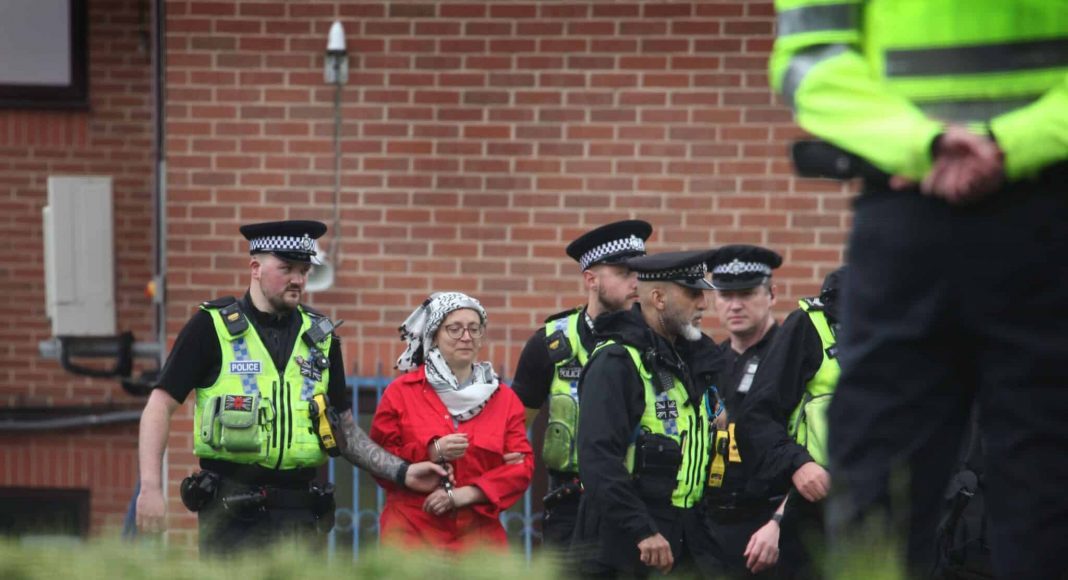On 19 July, former political prisoner Francesca Nadin told the Rally against Repression meeting in south London about the launch of a new organisation, Prisoners For Palestine (PFP). Since then, the group has organised prison protests and supported a successful hunger strike. FRFI spoke to Francesca.
FRFI: Can you tell us what led to Prisoners For Palestine being set up and what its main aims are?
Francesca: When I was remanded for taking action for Palestine, I wanted to continue resistance in whatever way I could. I found ways to do this by not cooperating with the system and by getting my writing out so that people could understand the reality of prison life. But there were no other comrades held where I was and no outside organisations to coordinate with prisoners held elsewhere; individual resistance is a lot more difficult when most people you are surrounded by are not already politicised.
We are seeing more people getting remanded in custody. There are currently dozens of Palestine actionists behind bars, many of whom have been repeatedly denied bail. So, when I got out of prison in March, I saw that other prisoners were having the same thoughts that I had had – that they wanted somebody to coordinate prison resistance, to be more effective and have a bigger impact.
Resistance doesn’t finish when you go to prison. Throughout history, political prisoners have been the centre of the struggle. So we have tried to establish a collective focus on this resistance, to work towards Palestinian liberation even during incarceration.
We reject the idea we are criminals or terrorists. It is the British government and the Zionist entity who are the guilty ones. We continue to accuse them and to encourage people to take action against the Zionist war machine and its British backers. Everything we do is an entry point to condemning and fighting the genocide.
FRFI: PFP began by organising two successful protests outside Bronzefield and Peterborough prisons. You were then thrown into a situation where you had to undertake urgent solidarity action with a comrade on hunger strike. How were these experiences and what did you learn from them?
Francesca: What PFP learned from Teuta Hoxha’s hunger strike is that, first, it is prisoner led. It was our comrade who decided to go on hunger strike. So, everything we did was to support them. We learned that we could be effective, that we could win our demands. We learned that it is essential for us to work with local groups, and that once that starts it snowballs. So, outside Peterborough during the hunger-strike other groups began organising protests themselves. That was an amazing thing. It’s crucial to build bridges with a wide range of people with different political ideas, towards a common goal.
We learned a lot from the strength, persistence and dignity of our comrade who was on hunger strike. And we learned the consistency of mirroring that resistance, whether through demos or call-outs to people to phone and email the prison.
The bridge from inside to outside the prison walls is essential. The state uses the tactic of isolating people in prison.
We learned we can overcome that; we can push through the fear, the paranoia that the state attempts to impose on us, and use creative ways to stop prisoners from being isolated.
FRFI: How can comrades who are not in prison support the work from outside?
Francesca: First and perhaps most important, is to educate ourselves. So obviously we have a lot of knowledge right now about the situation, the history, the context of the Palestinian struggle for liberation. But there seems to be a real lack of knowledge as to how the prison system works, and what prisoners in general, not just actionists, suffer, because there’s a real veil of secrecy around it.
Despite frequent references to abolition in a general sense, this is not widely talked about in activist circles. So, to have conversations about prison repression and educate ourselves to understand that it is part of the wider struggle. It is the same people running the prison system that run the military industrial complex. It’s one struggle against oppression, whether here or Palestine or elsewhere in the world.
Aside from education, people can join the activities we’ve already been doing to support prisoners – writing letters, talking about them widely to raise awareness, doing demos outside prisons or against the private prison contractors, phoning and emailing prisons in response to calls to contest restrictions on specific prisoners or in general. That pressure really does work to get them their basic rights, which is what happened with the recent hunger strike.
FRFI: Is there anything else you would like to add about what is important in this fight?
Francesca: It’s important to say that while we are speaking on behalf of prisoners who are on remand on political charges, we also stand shoulder to shoulder with all prisoners, both in this country and internationally. The prison protests on 15 August were specifically timed to coincide with the 21st anniversary of a massive hunger strike by Palestinian political prisoners in Zionist jails. When Teuta in Peterborough was on hunger strike, comrades in the US detained on similar charges also began refusing food in solidarity. International solidarity is crucial.
It’s also important to emphasise that the prisoners say to us that those of us outside must escalate the struggle. They tell us to remember why they are there, that it isn’t about them, that it’s about the fight against genocide, and that to show solidarity with our prisoners we have to step up our struggle against that oppression. That is the most important form of solidarity.
To find out more about Prisoners For Palestine, follow @prisoners4palestine on Instagram
FRFI 308 October/November 2025




